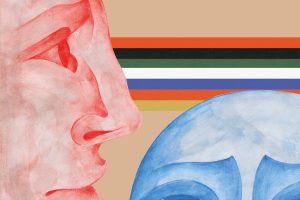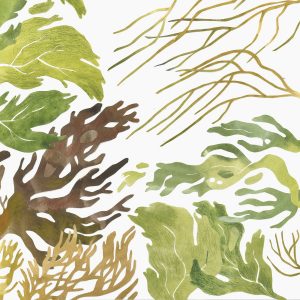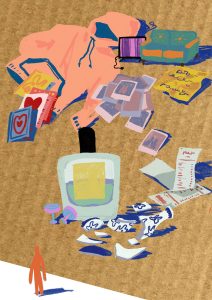
Amber Means Wait
by Laura Hankins | January 14, 2021
The sparrows had nested in a traffic light. They selected the orange filter, periodically warming themselves against the bulb whenever the light changed from green to red, or back again. When I first noticed them, crossing the road on my commute home, they looked like the end scene of a Looney Tunes flick. That’s all, Folks! At other times the nesting material formed an artificial horizon; the amber light behind it was their setting sun.
The chicks hatched in late April. It was unusually hot. I was wearing a summer dress and sandals. He had begun to talk to me using the same tone he reserved for his mother. City dust was sticking to the sweat between my exposed toes. I waited for the traffic lights to blend through their colour gradient, stop the cars and allow me to cross the street and disappear underground. I looked up as the middle light came on, hole-punching out the nest’s silhouette. The small bodies writhed blindly for a second before the light went out again, like a clip from a minimalist music video. The tinted lights were strobes, catching them in freeze-frame. The birds pulsed to the rhythm of the cars below, soft fleshy bodies pressed up against the edges of the nest.
At one week old, feathers sprouted like dark abscesses on their skin, growing along black lines that traced their spine and wing bones. Before that, they had been a translucent pink, skin too big for them like those hairless cats you see in glossy magazines. As they grew, their bones strained against their flesh, ribs like shipwrecked hulls, and their eyes opened as dark beads set into their heads . They began to fight for maggots, caterpillars, flakes of pastry, unencumbered by manners or common courtesy. I admired them for their persistence.
One day I bought an ice-cream on my way home. Licking the soft serve off my lips, I dialled up his number in an attempt to imitate the boldness of the birds. As my teeth crunched into the cone, I thought of twigs snapping underfoot, crackling bracken, the musk of earth and vegetation. That’s a smell you don’t encounter in the city. It’s the scent of growing plants pushing the dirt up in whole scoops, displacing it so forcefully that it rises as a fine powder. Geotaxis. They know which way to grow, even in the darkness.
All I could smell here was petrol and hot asphalt as the Westway pulsed around me. There was no hint of anything organic as I looked down at the unused digits still sitting there in my phone, thumb hovering over the call button. Distracted, I imagined thousands of seeds stranded deep beneath my feet – long, anaemic tendrils pressed skyward to hammer against the paving slabs above. Concrete is too thick for seedlings to dislodge. I realised I was still staring at my mobile, that I had missed my cue to cross the road. I locked the touchscreen and shoved the phone back into my pocket.
Spring began to fade into summer. The birds started singing, penetrating the rumble of traffic. I didn’t like it. I preferred for them to be illuminated silently, like small zeppelins in a searchlight. Calling loudly for food, they seemed too robust, too mature. Too sure of what they wanted. Soon they would leave the nest, catching rides on the synthetic thermals of car exhausts, or on the hot wind that escapes the entrance to the Underground. I thought of his belongings strewn across our room, jeans intertwined with mine, like a makeshift snare. Amber means wait. I no longer enjoyed watching the birds once I could hear them, too.
The chicks fledged in June. As I studied them, the traffic lights changed again. Green, traffic pounding. Amber, an empty nest. Red. Red means stop. I stepped over them as I crossed the road, melted tarmac coating their feathers like oil. Young birds seeping into the concrete heart of the city, sinking without a trace.∎
Words by Laura Hankins. Art by Liv Fugger.




